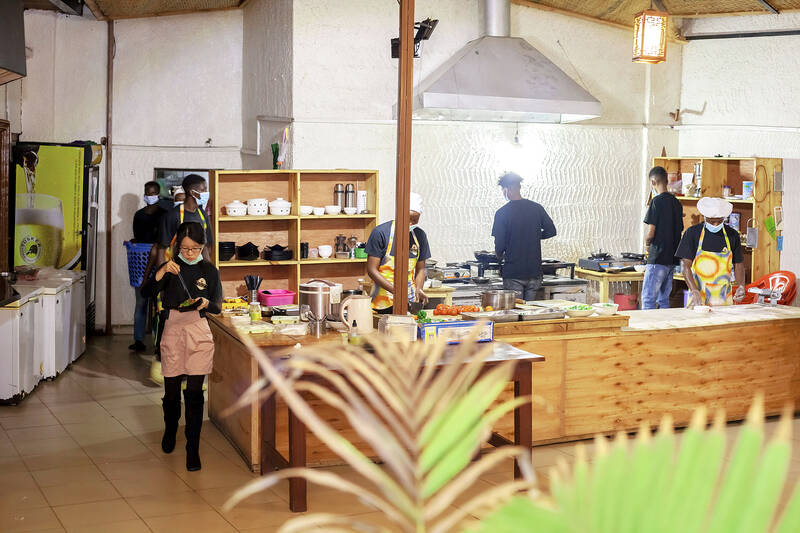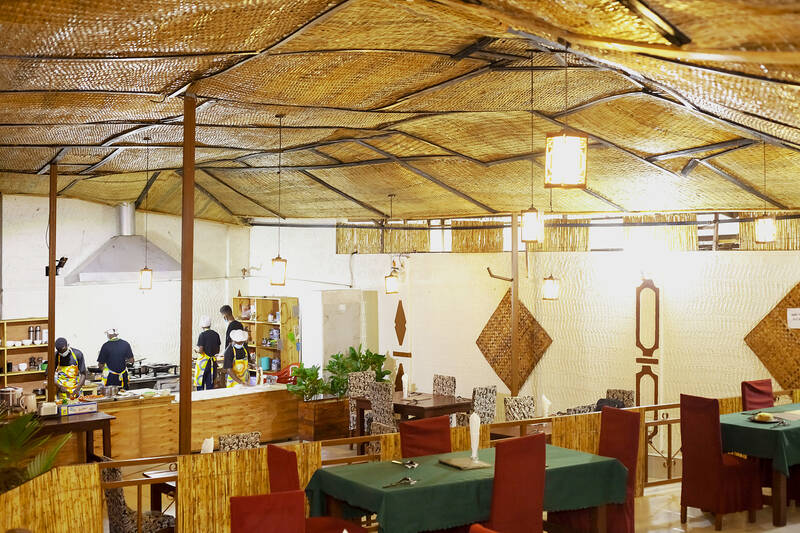Anyone walking around BK Arena in the Rwandan capital of Kigali who is familar with Taiwanese cuisine might be surprised to smell the fragrance of familiar dishes in the air.
Visitors can even detect the aroma of Taiwan’s famous beef noodles, chive buns and dumplings if they visit the neighborhood on the right day.
These delectable flavors can be traced to Sizzling Plates Restaurant, a small diner located just across from BK Arena.

Photo: CNA
Patrons of the eatery have a plethora of traditional Taiwanese food from which to choose, whether it is vegetarian appetizers such as braised tofu or spicy entrees like mapo tofu, or the nation’s staple braised pork rice and potstickers.
The restaurant also offers special deals on dumpling dishes on Thursdays and Sundays, while a phone call to the eatery a few days ahead of a visit gives owner Teresa Fang (方薏婷) enough time to prepare her signature soup dumplings, which are only available by request.
Besides juggling her duties as the restaurant’s owner and head chef, Fang, 36, is also a busy mother whose Japanese husband works for the UN in Africa.

Photo: CNA
STABLER AND SAFER
The family has traveled across Africa due to her husband’s job, but the couple eventually decided to settle down in Rwanda, where both parents can work while their children grow up in an environment that is stabler and safer than neighboring nations, Fang said.
With degrees in health economics and biochemistry, plus previous work experience as a researcher and tutor at graduate school, Fang originally planned to look for a job within her field of expertise.
However, with the outbreak of the COVID-19 pandemic, Fang was forced to seek alternative job solutions when the companies she had set her heart on stopped hiring.
That was when the chance of purchasing a restaurant across the street from East Africa’s biggest indoor arena presented itself. Only then did Fang decide to make a hard turn in her career path and pursue cooking full time.
She recalled how she enjoyed recreating the flavors of her hometown cuisine while attending high school abroad, and the excitement she felt when she made dumpings for her and her husband while they lived in Australia. When they had children, she also felt happy making healthy food for them.
Fang was also motivated by her father, who passed away in February 2020.
“I reflected on the time we had together and how he truly lived in accordance with the ‘love what you do and you will never work a day in your life’ philosophy,” Fang said. “He truly enjoyed his work and always encouraged us to do what makes us happy and healthy.”
Sizzling Plates opened its doors in early 2020 amid the global pandemic, which Fang attributes to her personality of needing to get things done.
The restaurant first tailored to the expat population looking to satisfy their desire for something different from the ubiquitous Rwandan cuisine. Eventually, the dishes became popular, customers kept coming back with friends and word spread.
In the two years since the restaurant opened, Fang said she has even served six or seven fellow Taiwanese nationals.
LOCAL AND NATURAL
Instead of Taiwanese ingredients, Fang bases her recipes on local products and draws from her background as a health economics expert.
“I have always been very health conscious with my background in biochemistry, and of course after I become a mom,” Fang said. “I tend to use natural ingredients to make food for my family. After moving to Rwanda, I have to cook almost everything from scratch because it’s not easy to find Asian condiments.”
Not only does she insist on using no MSG in her food, Fang also makes sure no artificial flavoring is added to the Rwandan soybeans which she uses to make homemade tofu for her eatery.
Fang also taught her employees how to use a dough roller to turn Rwanda’s wheat flour into Taiwanese buns and dumplings.
Thanks to her insistence on using healthy ingredients and the unique flavors of Taiwanese cuisine, Sizzling Plates currently has an exclusive menu that sets her food apart from other Asian restaurants in the area.
When asked about the challenges in Rwanda, Fang points to the language and cultural differences she faces everyday, such as the pace of daily life and managing a restaurant in a country that has an unstable power grid and water supply.
That aside, Fang said she and her family are content and happy in the African country and will continue to bring the sizzle to Kigali.
“I really enjoy raising my kids here.” she said. “I cherish it’s natural environment and the simplicity which is so rare in other countries. My kids also enjoy living here. I don’t know where life is going to take us, but for now we are just enjoying ourselves here.”

This month the government ordered a one-year block of Xiaohongshu (小紅書) or Rednote, a Chinese social media platform with more than 3 million users in Taiwan. The government pointed to widespread fraud activity on the platform, along with cybersecurity failures. Officials said that they had reached out to the company and asked it to change. However, they received no response. The pro-China parties, the Chinese Nationalist Party (KMT) and Taiwan People’s Party (TPP), immediately swung into action, denouncing the ban as an attack on free speech. This “free speech” claim was then echoed by the People’s Republic of China (PRC),

Exceptions to the rule are sometimes revealing. For a brief few years, there was an emerging ideological split between the Democratic Progressive Party (DPP) and Chinese Nationalist Party (KMT) that appeared to be pushing the DPP in a direction that would be considered more liberal, and the KMT more conservative. In the previous column, “The KMT-DPP’s bureaucrat-led developmental state” (Dec. 11, page 12), we examined how Taiwan’s democratic system developed, and how both the two main parties largely accepted a similar consensus on how Taiwan should be run domestically and did not split along the left-right lines more familiar in

Specialty sandwiches loaded with the contents of an entire charcuterie board, overflowing with sauces, creams and all manner of creative add-ons, is perhaps one of the biggest global food trends of this year. From London to New York, lines form down the block for mortadella, burrata, pistachio and more stuffed between slices of fresh sourdough, rye or focaccia. To try the trend in Taipei, Munchies Mafia is for sure the spot — could this be the best sandwich in town? Carlos from Spain and Sergio from Mexico opened this spot just seven months ago. The two met working in the

Many people in Taiwan first learned about universal basic income (UBI) — the idea that the government should provide regular, no-strings-attached payments to each citizen — in 2019. While seeking the Democratic nomination for the 2020 US presidential election, Andrew Yang, a politician of Taiwanese descent, said that, if elected, he’d institute a UBI of US$1,000 per month to “get the economic boot off of people’s throats, allowing them to lift their heads up, breathe, and get excited for the future.” His campaign petered out, but the concept of UBI hasn’t gone away. Throughout the industrialized world, there are fears that